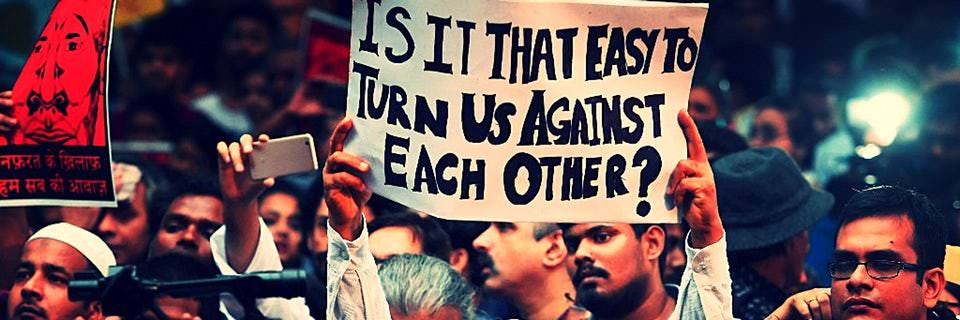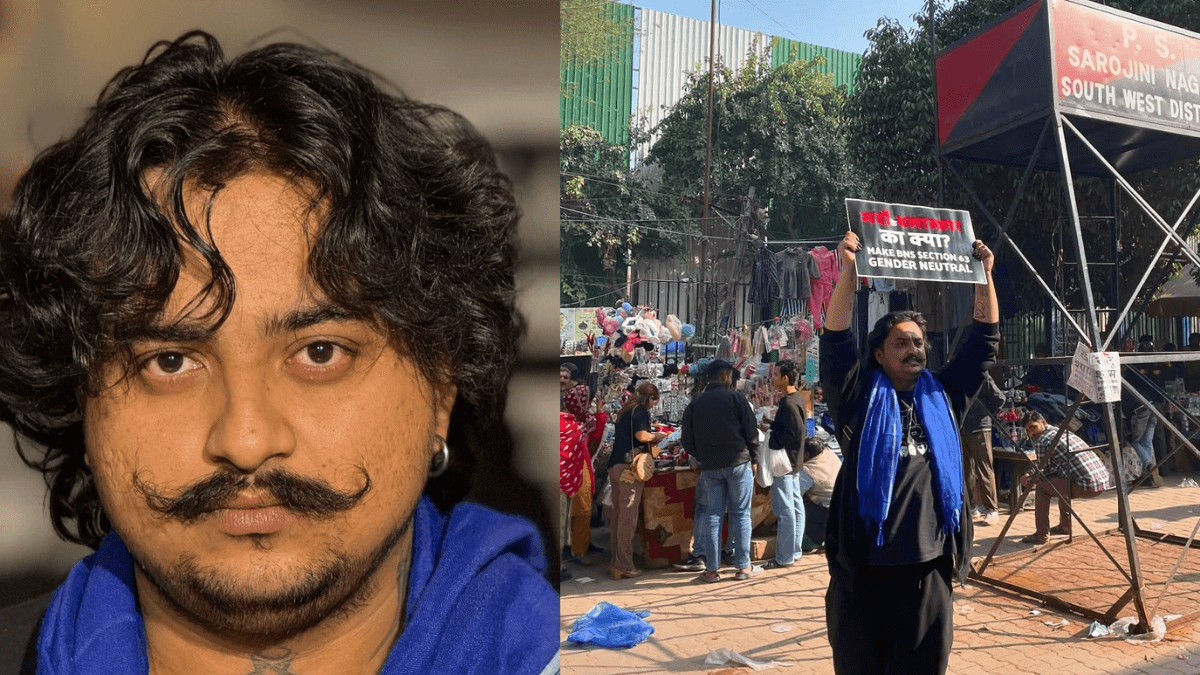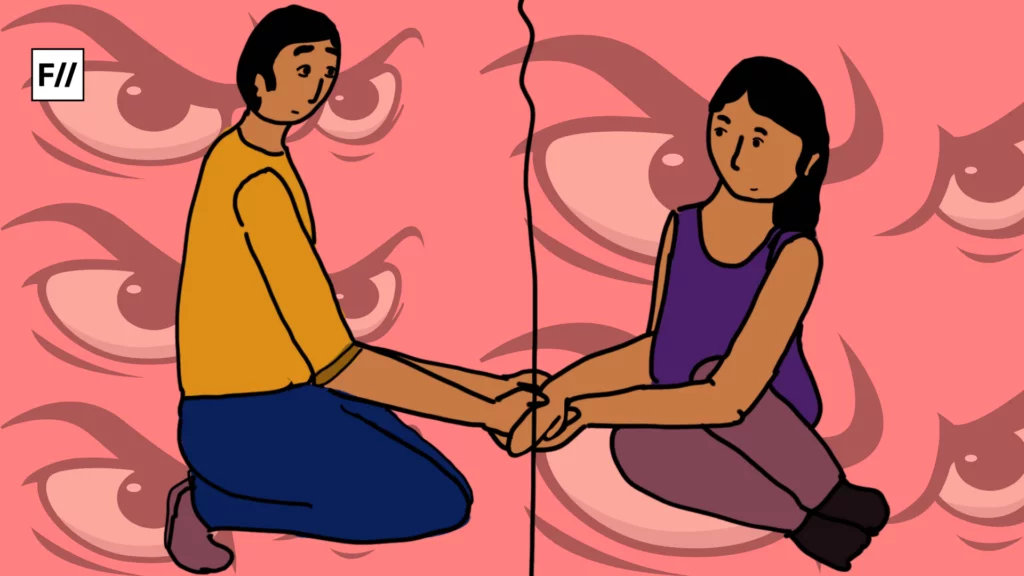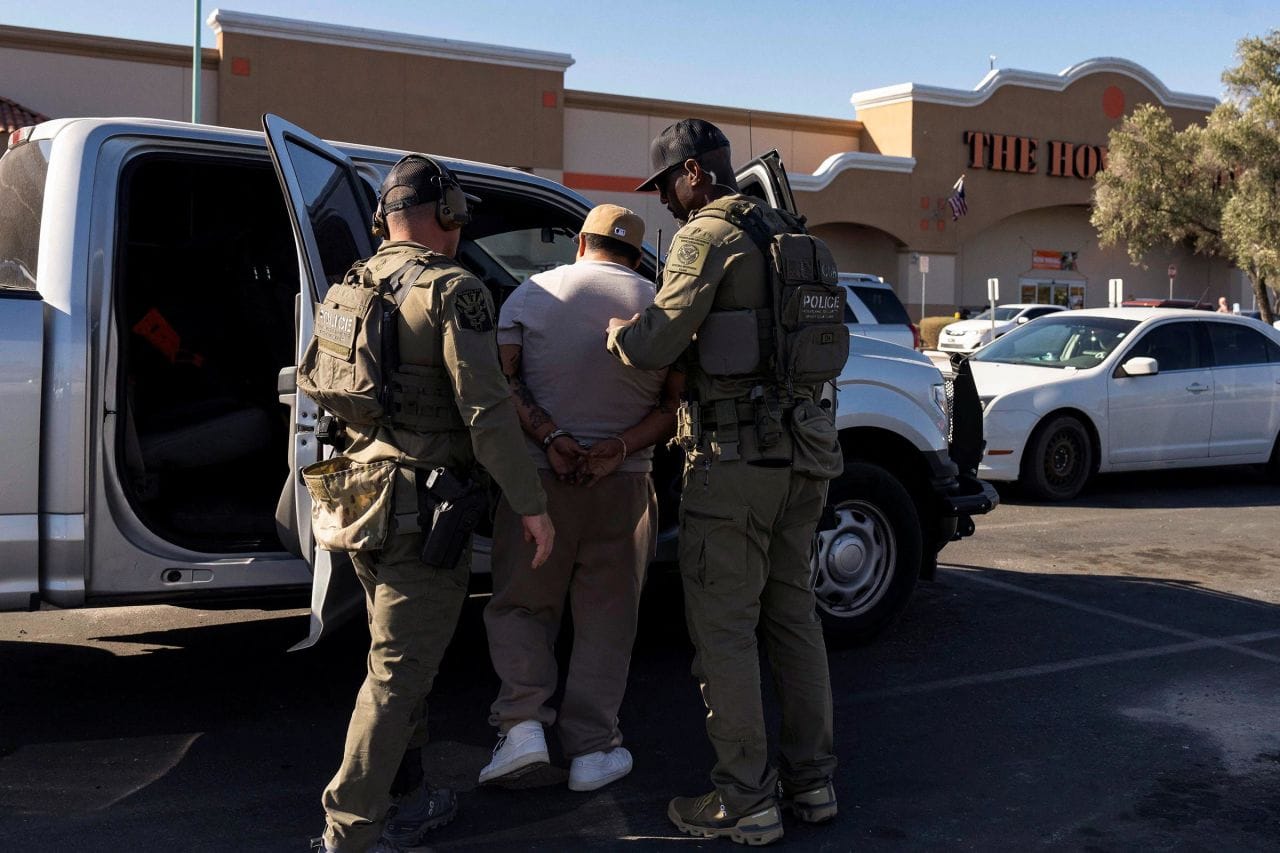According to the Facebook event page, #NotInMyName was a “Citizens’ protest against the recent spate of targeted lynching of Muslims in India – the most recent of 16 year old Junaid, stabbed to death on a suburban train on 23 June 2017 in Delhi (NCR). These attacks on Muslims are part of a pattern of systemic violence against Dalits, Adivasis, and other disadvantaged and minority groups across the country.”
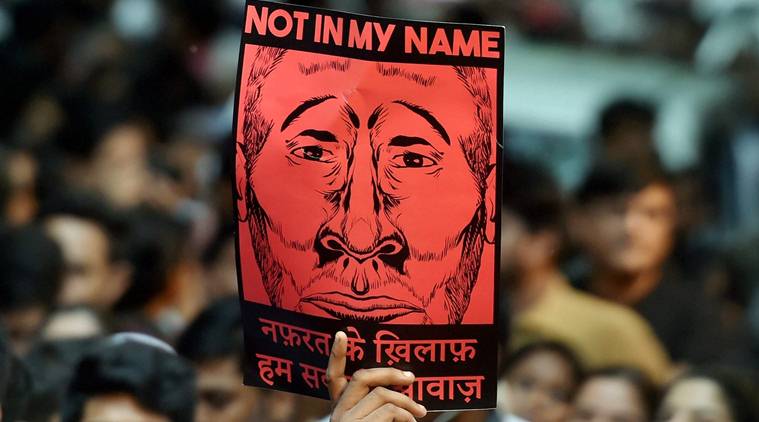
Image Credit: Scroll.in
Now that the protest is over, the unrest has settled, similar questions have been lingering in our minds – is it going to die out like every other time?
To begin with, let’s applaud the effort that was put into #NotInMyName, and in Sanjay Kak’s words, let us remind ourselves that the real power is in fighting and never giving up, not attaining the results in the very first attempt.
“You don’t fight because you know you’ll win, you do it because that’s all that you can do at that moment.” – Sanjay Kak, filmmaker
India has seen horrifying murders in the last three years. With the advent of a right wing government, various hate mongers have been given a free hand in the name of gau-raksha, and hate crimes in the name of religion and caste have drastically increased. Starting from Mohammed Akhlaq in 2015, it reached various other people such as Pahlu Khan, Zafar Hussain and various states such as Rajasthan, UP, Jharkhand, and Kashmir over two years.
The common link between these people? All of them belong to a marginalized section of the society. It finally reached a point where a 16 year old boy, Junaid Khan was brutally killed on a moving train, following a communal fight with fellow passengers. It started off as a seemingly innocent fight for a seat, but soon as the arguments heated, it changed its track to where it’s expected in a fight between a Hindu and a Muslim – within no time, communal slurs were being hurled. Junaid was accused of being a ‘beef eater’, ‘terrorist’, an ‘anti-national’, and even for wearing a skull cap, which represented his religion. But it did not stop just there. Junaid was killed in cold blood. He was killed in a train with almost two hundred other people on it.

Image Credit: The Wire.in
Also read: On Mob Lynchings, Silence And The State of India’s Conscience
As the news of Junaid’s murder spread, the conscience of people across the nation stirred. A 16 year old boy, with his whole life ahead of him was made the victim of something so vile. A 16 year old son, in whose eyes his parents saw their days of a secure old age, was stabbed, those visions dimmed. Pictures of Junaid’s blood splattered on the train floor had spread all over the internet. This horrifying event took place on 22nd of July, 2017, just a few days before Eid. Muslims from various parts of the nation decided not to celebrate Eid, their only major festival apart from Eid-ul-azha. The entire village of Junaid was mourning and on their tears, the entire nation was choking.

Image Credit: Hindustan Times
A lot of frustration had crept into the hearts of people, along with the usual fear for life. A space for all the frustration to come out was required. You see, it was important to scream, shout, cry and mourn the loss that the nation had suffered. #NotInMyName came as the perfect outlet to that anger and helplessness, giving way to urgent expression and relief.
It started off as a Facebook event by a film maker based in Gurgaon, Saba Dewan, but soon various activists, even celebrities joined in, giving it the publicity that a protest like this demands. It instantly spread to more than ten states in India and some cities in Pakistan, the UK and Canada.
Junaid’s murder was a trigger which brought people from all strata together to voice their anger and helplessness. Political representatives such as Manish Sisodia, celebrities such as Konkana Sen and Shabana Azmi, various activists, senior journalist Rana Ayyub, were set to be part of this.
Soon after it started to gain attention, various organizations and individuals started to find faults with it. “Not in my name? It is in my name, it always will be.” Identities are important, they said. “Why Jantar Mantar?” Go to the ghettos, they said. Various people decided not to join the protest. Was participation from a liberal middle class society reason enough to not participate in a roar against injustice, or to completely boycott it? Of course the naming was nuanced, but was it enough to turn the entire protest seem futile? Amidst all this, we lost a good number of people and voices. Various individuals, and major Muslim organizations like The Muslim Personal Law Board, Jamiat Ulama-e-Hind, Jamat-e-Islami and several others which otherwise organize large-scale Islamic gatherings, did not join this protest. These organizations had the cadre to make #NotInMyName an even bigger story, but they chose not to.
Also read: Not In My Name – Delhi Protests The Lynching Of Minorities

Image Credit: Hindustan Times
One of the major issues that people saw with this protest was the location, and considering that, also the kind of people that participated in it. It was considered trivial because it was started, and marketed on Facebook. Sure, mobilizing on social media would usually mean that people from a specific background attend the gathering, but the fact that the invitation to this protest was being sent to me from cousins belonging to rural areas and cities alike, the message being circulated on family groups by people who do not even use Facebook, reflected that it had reached very far. It had its origin on Facebook, but within no time it became a nationwide, secular protest. In fact, it was one of the biggest reasons so many people could be mobilized and brought together on a rainy evening without the usual bickering.
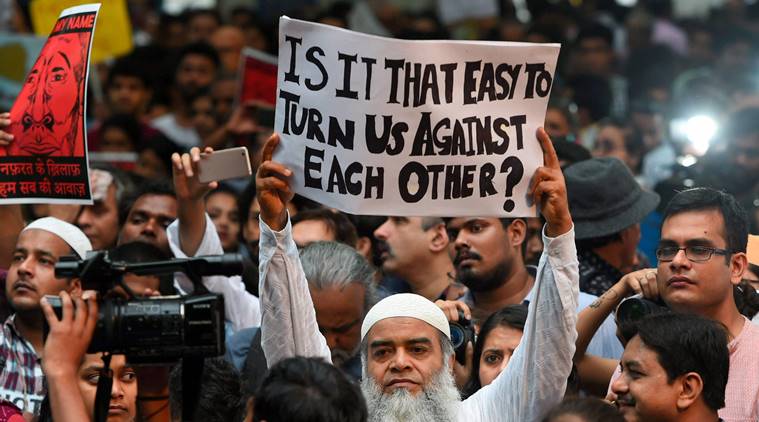
Image Credit: Indian Express
Rajesh Rajamani has, in his article, raised some important questions about Brahmanism, equating #NotInMyName with #NotAllMen. It is true that dismantling Brahmanism is the requirement, going into the root of its causes is also essential, but is it possible to do it in one go? Is it justified to blame one protest for not raising these questions, and then terming it evil? Aren’t these greater questions we need to ask, and expect a more sustainable answer for them? Just because Brahmanism cannot be immediately eradicated, do we lose our rights as individuals to protest against inhumane lynching all across the country?
The protest wasn’t absolutely flawless, of course; it had its share of flaws, but let me tell you why it was important to be part of it, despite the various qualms regarding it. It didn’t change the entire scenario, and it wasn’t intended to but it still matters because it was a beginning. Aren’t we losing out on the motive because of our internal conflicts? Don’t we all wish for a more secure nation for our brethren and sistren? Each protest matters, and every voice that became part of the shout matters because if you are going to wait for the ideal protest, well, it’s never going to happen.
Protests that demand immediate attention cannot wait for the perfect strategies, tactics and names to be devised. Thousands of people were agitated, they needed a space to mourn together, see that other people care, that people share their pain and agony. This protest was important for the people who attended it, for people who couldn’t, for people like you and I. The protest was important for Junaid’s parents, for them to know that their pain is not theirs alone, that there are women who are calling Junaid their son, and wailing for him.
Protests matter because they are the collective unheard voice of the nation – unheard pleas and unanswered questions. Every single voice that shouted the slogans with us that day gave strength to the naara so that it could be heard by as many people as possible. It was a call to shout sense into the ears of these hate-mongers, to end this jahalat. It is important to ask ourselves, are we losing the essence of this protest by creating rifts between ourselves? Filmmaker Mahesh Bhatt recently quoted philosopher J Krishnamurti in his tweet, “We have made life into a battlefield, each family, each group, each nation against the other.” Does this sound relatable?
#NotInMyName forced out a series of tweets from PM Modi, who has never really acknowledged this issue before.
Killing people in the name of Gau Bhakti is not acceptable. This is not something Mahatma Gandhi would approve: PM @narendramodi
— PMO India (@PMOIndia) June 29, 2017
This success, however little, should not be underestimated. Empty words aren’t enough; they need to be backed by action. But keeping the positivity intact, acknowledging the issue could be a start. Imagine had he done this when the first case happened, when Mohammad Akhlaq was murdered. If he had pointed it out the very first time, maybe something would have turned out differently. But he didn’t, and it didn’t.
There are various tweets we wish PM Modi had cared to write. But maybe, just maybe, in the future these mobs would think at least once, if not about the victim, maybe about the circumstances, given that the PM has categorically called violence by ‘Gau-rakshaks’ unacceptable. People who advocate violence and practice this cannot do so in the name of the PM anymore, because he openly denounced it by calling it ‘unacceptable’. If it cannot act as a consolation to us, it might at least act as a silent message to these hate-mongers.
The fact that these tweets came out a day after the protests and not immediately after Junaid’s murder indicate that people coming together still works.
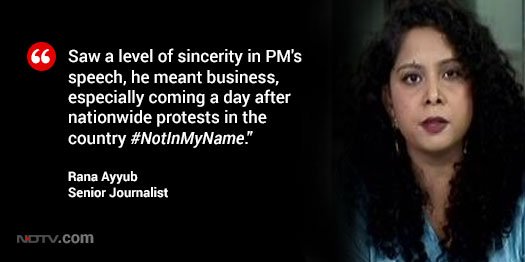
Image Credit: NDTV
We need to understand that this protest, if not anything else, has at least sensitized the people. Sure, its success cannot be measured only by a few tweets by the PM, but in the fact that people everywhere are talking about it, on TV and the web. The success of this protest can be gauged by the number of people who turned up despite heavy rainfall, only to share a few moments of solidarity and to say a few prayers for Junaid. The privileged, well off people, the unprivileged, the famous, the common, the students and multiple PhD holders that attended, took out time from their schedules to come, and it matters.
As this article in Times Of India states, “There is nothing inevitable about massing on the streets and getting your way. For every successful story of a Tahrir Square in Egypt or a civil rights march in the US, there have been countless protests that failed despite their numbers. Somewhere between 15 and 36 million people protested the Iraq invasion; this largest-ever public demonstration was coolly ignored. All protests, in their own capacities are important.”

Image Credit: Hindustan Times
I wish there was only this protest to be part of, this one battle to fight, but alas, it is a continuous process of ‘educating, agitating and organizing’, which will go on for a long time.
A hundred more, well-designed and strategically planned protests and action plans are required to form a solution for this in the long run. And hence it is important to remember, that even though this protest is over, the fight still goes on. Remember, a 16 year boy was killed. He was murdered. We need to unite our voices to be able to get anything out of it. More than showing solidarity, it was important to show the authorities that we are alive, our conscience is alive, and we will speak up. We all need to stand together in this fight. Remember, he was murdered in cold blood. On a moving train, with 200 people onboard. This protest, even though lofty, ambitious and wishful must be kept as a reminder of the conscience of the average Indian…until next time.
“Nasheman par nasheman iss qadar tamer karta jaa,
Ke bijli girte girte aap khud bezaar ho jaaye…”
(Keep building a house after house with such determination that the falling thunder gives in to your courage)
-Allama Iqbal, poet
Featured Image Credit: The Quint
About the author(s)
Can one take pride in calling herself an intellectual badass?
